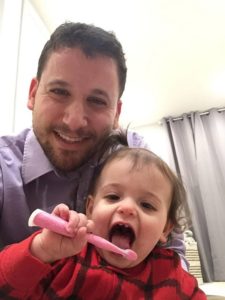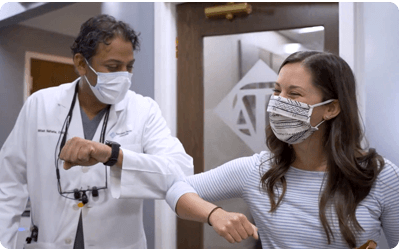 February is Children’s Dental Health Awareness Month and we have been making an extra effort this month to bring information to parents about the importance of regularly scheduled dental care for kids. Teaching good brushing and home care habits, eating a healthy balanced diet, and proactively caring for kids’ teeth by bringing them in for routine hygiene appointments can have a huge impact on their health over their entire lifetime.
February is Children’s Dental Health Awareness Month and we have been making an extra effort this month to bring information to parents about the importance of regularly scheduled dental care for kids. Teaching good brushing and home care habits, eating a healthy balanced diet, and proactively caring for kids’ teeth by bringing them in for routine hygiene appointments can have a huge impact on their health over their entire lifetime.
A child’s first visit to the dentist should be scheduled by the time their first tooth appears, or by his or her first birthday. According to the American Dental Hygienists Association, every dollar spent on preventative dental care could save $8 to $50 in restorative and emergency dental treatments down the road. The preventative care provided by a registered dental hygienist can also potentially prevent additional types of medical treatment over a person’s lifetime.
The American Academy of Pediatric Dentistry has determined that more than 50 percent of children will be affected by tooth decay before age five. Once children get to school age poor oral health can have a big impact on their learning and academic performance as well. The National Education Association research shows students who have experienced recent oral health pain are four times more likely to have lower grade point averages than their counterparts who have not. The Office of the Surgeon General reports that more than 51 million school hours are lost each year to dental-related health conditions.
As soon as baby teeth erupt, they should be brushed by parents using a tiny amount of toothpaste, about the size of a grain of rice. Helping toddlers learn to brush early establishes healthy home care habits that will follow them throughout life.
Get them used to the toothbrush and a brushing routine by trying to make it fun with games, songs and other activities when brushing. Follow the 2-2-2 rule: brush for 2 minutes 2 times a day and visit the dentist 2 times a year. Kids will need help with brushing and flossing until they are 7-8 years old. They can brush on their own first, but then follow up to be sure back teeth are well brushed and clean.
Between 6 months and 16 years of age children’s teeth are developing but they are not as hard and strong as they could be with fluoride treatments. Fluoride strengthens teeth and prevents cavities. Having fluoride treatments done at your child’s hygiene appointment can help your kids avoid the discomfort of cavities and start them off on a path to keep their natural teeth for their entire lives.
Our hygiene team at TDA are trained to help parents learn and manage their children’s oral health care. We can share tips and tricks, answer all of your questions and make a kid’s dental experience gentle and anxiety free. We go out of our way to provide the insight, advice, and knowledge you need to give you and your child an outstanding dental experience.
Christina Tardie, TDA Registered Dental Hygienist






